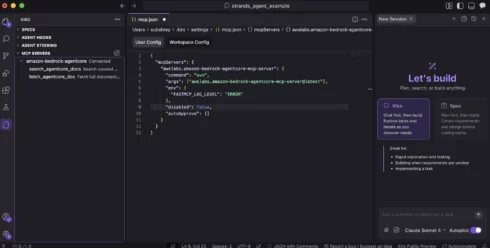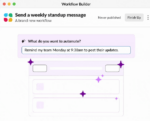
Amazon Bedrock AgentCore MCP server now available
The AgentCore MCP server offers built-in support for runtime, gateway integration, identity management, and agent memory. It was created to speed up the process of creating components that are compatible with Bedrock AgentCore.
“What typically takes significant time and effort, for example learning about Bedrock AgentCore services, integrating Runtime and Tools Gateway, managing security configurations, and deploying to production can now be completed in minutes through conversational commands with your coding assistant,” AWS wrote in a blog post.
DigitalOcean updates Gradient AI Platform
The Gradient AI Platform is a platform for building AI agents without needing to manage the underlying infrastructure. New features that have been added include support for image generation, auto-indexing of knowledge bases, and VPC integration.
Additionally, DigitalOcean revealed that it will be expanding the platform further in the next few weeks with new offerings like the Gradient AI AgentDevelopmentKit and Gradient AI Genie, which integrates into IDEs and can be used to manage multi-agent systems using natural language.
Microsoft announces preview of its new Agent Framework
Microsoft has announced a preview of the Microsoft Agent Framework, an open-source development kit for .NET and Python for creating AI agents and multi-agent workflows.
It supports creating individual agents as well as graph-based workflows to connect up multiple agents.
According to Microsoft, the Agent Framework is a direct successor to its other projects Semantic Kernel and AutoGen, utilizing foundations from both. It brings together Semantic Kernel’s enterprise-grade features like thread-based state management, type safety, filters, telemetry, and model and embedding support, with AutoGen’s abstractions for single- and multi-agent patterns.
Mendix updates its low-code platform with agentic AI features
New agent and genAI features include an agent builder, the ability to create project plans using generative AI, the ability to create microflows and workflows with AI, and support for MCP.
Another focus area of the release is business process automation, and new features related to that include the ability for Mendix Workflows to call AI agents, dynamic case management, and Global Inbox, a single view for all tasks from multiple distributed workflows.
California passes law to ensure safe innovation of frontier AI models
Earlier this week, California’s governor Gavin Newsom signed a new law designed to ensure safe development and deployment of frontier AI models.
“California has proven that we can establish regulations to protect our communities while also ensuring that the growing AI industry continues to thrive,” Newsom said. “This legislation strikes that balance. AI is the new frontier in innovation, and California is not only here for it – but stands strong as a national leader by enacting the first-in-the-nation frontier AI safety legislation that builds public trust as this emerging technology rapidly evolves.”
The law, SB 53, establishes requirements for companies developing frontier AI models, spanning five categories: transparency, innovation, safety, accountability, and responsiveness.
Slack evolves to support agentic capabilities built on conversation data
Salesforce is announcing several major updates to Slack that will enable customers to leverage their conversation history for AI apps and agents.
The company is announcing a real-time search (RTS) API, which surfaces up-to-date discussions, files, and channels to provide agents access with context-aware information. To ensure secure use of information, data remains in Slack and the API adheres to existing user access permissions and only retrieves data that is relevant to the query.
“It unlocks your organization’s collective intelligence, securely connecting agents to conversations and decisions that were once trapped in silos,” Salesforce wrote in a blog post.
Anthropic claims its newly released Claude Sonnet 4.5 is the “best coding model in the world”
Claude Sonnet 4.5 achieves a 77.2% on the SWE-bench for software engineering, compared to 74.5% for Claude Opus 4.1 and 72.7% for Claude Sonnet 4. For external comparison, GPT-5 Codex scored at 74.5%, GPT-5 scored 72.8%, and Gemini 2.5 Pro scored 67.2%.
Additionally, it leads in the OSWorld benchmark, which tests AI models on real-world computer tasks. It scored 61.4% on that benchmark, beating out Claude Sonnet 4, which scored 42.2%.
“Sonnet 4.5 can produce near-instant responses or extended, step-by-step thinking that is made visible to the user,” Anthropic says.
According to Anthropic, Claude Sonnet 4.5 also shows better domain-specific knowledge and reasoning in the fields of finance, law, and medicine.
Workato announces MCP platform
Workato Enterprise MCP provides customers with access to over 100 fully managed MCP servers that can connect with different LLMs and agents, including ChatGPT, Claude.AI, Amazon Q, Cursor, and Google Gemini. Some of the MCP servers available in the platform include ones from Atlassian, Box, Reddit, Salesforce, Okta, and Shopify.
“At Workato, we hear every day that while MCP is exciting, enterprises still face challenges making MCP work securely, effectively, and reliably at scale,” said Adam Seligman, Chief Technology Officer at Workato. “Workato Enterprise MCP changes that by bringing the full spectrum of business processes, from the front office to the back office and everything in between, to AI agents through MCP. With pre-built, enterprise-grade servers and skills, we’re giving global enterprises a first-of-its-kind solution that unlocks AI agents to safely execute real business processes at scale, delivering measurable business value.”
VibeSec embeds security analysis into AI coding models to prevent generation of insecure code
OX Security is shifting security as far left as it can go with the launch of VibeSec, which it says can stop insecure AI-generated code before the code even gets generated.
It does this by embedding dynamic security context into the coding model so that it doesn’t suggest code that contains security issues.
“VibeSec doesn’t just accelerate security – it fundamentally changes how security operates. For the first time, security moves faster than vulnerabilities,” said Neatsun Ziv, co-founder and CEO, at OX Security.
OutSystems launches Agent Workbench
Agent Workbench allows users to create and orchestrate AI agents that leverage their company’s data sets and workflows. For example, in early access, Axos Bank built a log analysis agent to interpret error logs and Thermo Fisher Scientific used it to build a Customer Escalation Agent that interprets unstructured data from customer interactions.
“Agent Workbench was created to give our customers the tools they need to build the agentic future with OutSystems. Our Early Access Program participants have realized impressive results with Agent Workbench, positioning them as industry leaders in agentic AI,” said Woodson Martin, CEO of OutSystems.






